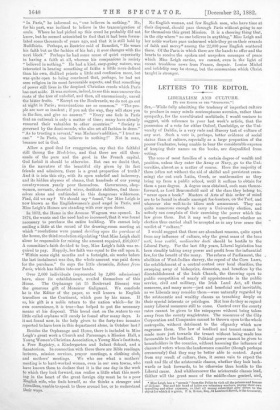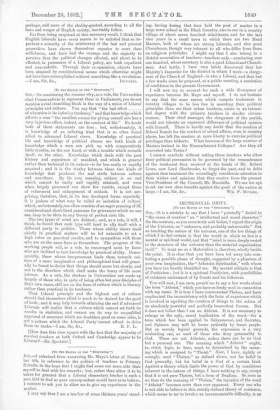LETTERS TO THE EDITOR.
LIBERALISM AND CULTURE.
[TO THE Einron OF THE "SPEOTATOR."1 • Miss Leigh has a "permit" from the Pollee to visit all the prisons and houses of ill.fnme. She and her hand of ladies are voluntary workers, paying their own travelling and other expenses, so that all money enbanribed goes direet to the Object for whioli it is given. F. A, Bevan, Rag, 54 Lombard Street, is the treasurer.
Si,—While fully admitting the tendency of imperfect culture to produce in many minds contemptuous aversion, rather than sympathy, for the uncultivated multitude, I would venture to suggest, with reference to your last week's article, that the possession of a vote for either Oxford, Cambridge, or the Uni- versity of Dublin, is a very rude and illusory test of culture of any sort. Such a vote is, perhaps, better evidence of social status than of culture, especially as a large proportion of the poorer Graduates, being unable to bear the considerable expense of keeping their names on the books, are disqualified from voting ' The sons of most families of a certain degree of wealth and position, unless they enter the Army or Navy, go to the Uni- versities, almost as a matter of course. Here the majority of them (often not without the aid of skilful and persistent cram- ming) eke out such Latin, Greek, or mathematics as they bring up from a public school, until it suffices to obtain for them a pass degree. A degree once obtained, such men thence- forward, as Lord Beaconsfield said of the class they belong to, "never open a book." Masters of Arts of this order of mind are to be found in shoals amongst fox-hunters, on the Turf, and wherever else well-to-do idlers seek amusement. They are quite numerous enough to carry a University election, and nobody can complain of their exercising the power which the law gives them. But it may well be questioned whether an election thus carried shall be accepted as in any true sense the verdict of culture."
I would suggest that there are abundant reasons, quite apart from any influence of culture, why the great mass of the ben° nati, bene vestiti, mectiocriter docti should be hostile to the Liberal Party. For the last fifty years, Liberal legislation has been steadily taking away power and profit from the influential few, for the benefit of the many. The reform of Parliament, the . abolition of West-Indian slavery, the repeal of the Corn Laws, the establishment of a central control over local charities, the sweeping away of bishoprics, deaneries, and benefices by the disestablishment of the Irish Church, the throwing open to public competition of nearly all appointments in the public service, civil and military, the Irish Land Act, all these measures, and many more—just and beneficial and inevitable, as we Liberals may consider them—were naturally regarded by the aristocratic and. wealthy classes as trenching deeply on their special interests or privileges. Not less do they so regard many Liberal measures still to come. Control over the county rates cannot be given to the ratepayers without being taken away from the county magistrates. The resources of the City Corporation and Companies cannot be thrown open to the whole metropolis, without detriment to the oligarchy which now engrosses them. The law of landlord, and tenant cannot be made more just towards the tenant without being made less favourable to the landlord. Political power cannot be given to householders in the counties, without lessening the influence of classes of voters whom the landowners consider (though perhaps erroneously) that they may be better able to control. Apart from any result of culture, then, it seems vain to expect the rank and file of the aristocratic classes, whether they look back- wards or look forwards, to be otherwise than hostile to the Liberal cause. And whithersoever the aristocratic classes lead, thither will the great mass of the middle-class genteel, and, perhaps, still more of the shabby-genteel, according to all the laws and usages of English society, inevitably follow.
Far from being surprised at this necessary result, I think that 'English Liberals have every reason to be satisfied that so im- portant a minority of the aristocracy of the last and present generation have shown themselves superior to mere class dselfishness, and have had the courage and the sagacity to perceive that the political changes effected, and about to be 'effected, in pursuance of a Liberal policy, are both expedient and unavoidable. Through their co-operation, objects have been attained by constitutional means which otherwise might not have been accomplished without something like a revolution.


































 Previous page
Previous page